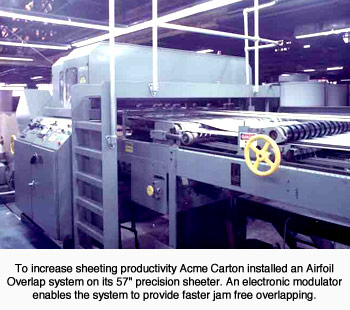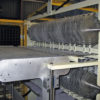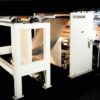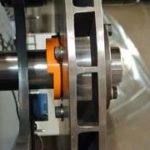More and more folding carton manufacturers are finding in-house sheeting provides a competitive marketing edge. It’s consistent with carton maker efforts to streamline the delivery schedule, increase assurance of product quality and improve customer service.
With its own operation, Acme Packaging, Canton, Mich., found it could improve profitability and reduce waste.
Before creating the in-house sheeting department, Acme purchased sheeted SBS board from Northstar Paper, a converting company it bought in 1982.

High shipping cost
“We found it advantageous buying paperboard from our own company because we could depend on the quality of the material we received, but there were some economics drawbacks,” says John Schamante, president of Acme Packaging. “We had to face the high costs of shipping material from Northstar to Acme. Larger orders took two to three trips via truck to get the material from the Northstar plant to Acme’s operation, which is 120 miles away.”
Additionally, Schamante notes that the timing involved in shipment could cause problems. “Sometimes we had to wait up to a week to receive converted material. That set us back on our production schedule. Acme prides itself on quality products and attentive service, and on-time deliveries have been key to obtaining and keeping customers.”
To improve operating efficiencies, Acme merged with Northstar in 1986 and moved to its present facility. By housing all sheeting, die cutting and printing equipment in one location, Schamante found the output and quality of end products.
The 58-year-old company produces folding cartons for a Midwest customer base consisting largely of pharmaceutical, toy and hardware manufacturers, and bakeries.
To further boost productivity Schamante decided to upgrade Acme’s converting equipment. He wanted to improve the speed, in particular, of the new sheeting operation. Northstar had been using an older 103″ sheeter that did not provide the speed and cutting accuracy of more modern machines.
Turnaround trimmed
After reviewing a number of sheeters in operation, Acme chose an MSL precision sheeter with shaftless roll stand and Series 250 stacker, from Maxson Automatic Machinery Co. Since its installation, Acme has been sheeting roughly 80 tons of SBS a week, at up to 700 feet per minute.
Faster production has enabled the company to trim turnaround time considerably.
Outfitted with a (patented) Airfoil Overlap system, the sheeter provides faster feeding from the cutting section to the stacker. The system forces the tail end of the first sheet down, while forcing the leading edge of the oncoming sheet up. This provides safe, jam-free overlapping. An electronic modulator adjusts the flow of air through the system in relation to line speed, which assured jam-free overlapping even at high speeds.
The Series 250 stacker also increases Acme’s productivity and efficiency in sheet collecting and jogging. It provides an even-sided well-jogged pile and eliminates the need for continuous operator attention because of its automatic feed down table.
In-house sheeting has provided Acme with economic benefits.
“By getting our material in roll form, we can sheet to order and stay ahead of the presses,” says Schamante. “As a result, we’ve been able to decrease waste levels and improve quality. The sheeted skids we used to skip from our supplier sometimes sat in storage for a week or two.”
In-house sheeting has eliminated waste from trimming. When Northstar was supplying Acme with sheeted board, the folding carton manufacturer often found it necessary to trim material to fit a customer’s order. Acme can now economically sheet board to a precise size. The precision sheeter has eliminated a production step.
New QC tactic
The quality of the converted board has improved. An Acme operator inspects the SBS board as it comes off the stacker. If it is not up to company standards, it is rejected before it reaches the printing presses, Schamante says.
To ensure a clean, dust-free skid, a PEN MAM dust collecting system was ordered with the sheeter. Located at the delivery tape section of the sheeter, the system suctions dust off the sheets through flexible hosing and collects it in a box with four individual filters.
“The PEN MAM system has become essential in keeping our boards clean from dust before they reach the printer,” says Bob Sowa, plant manager. “Even with our state-of-the-art equipment, clean boards ensure the highest quality printing job, free of marks or flaws.”
Sowa is optimistic about the entire plant. “Overall, we’ve been able to control quality, turnaround time and waste levels with in-house sheeting. It allows us to monitor all phases of converting –from sheeting to die cutting to gluing. That’s important for product consistency. Acme has become well know for its service and quality. In-house sheeting will allow us to improve the marketability of our cartons.”
Reprinted from Paperboard Packaging, May 1988






